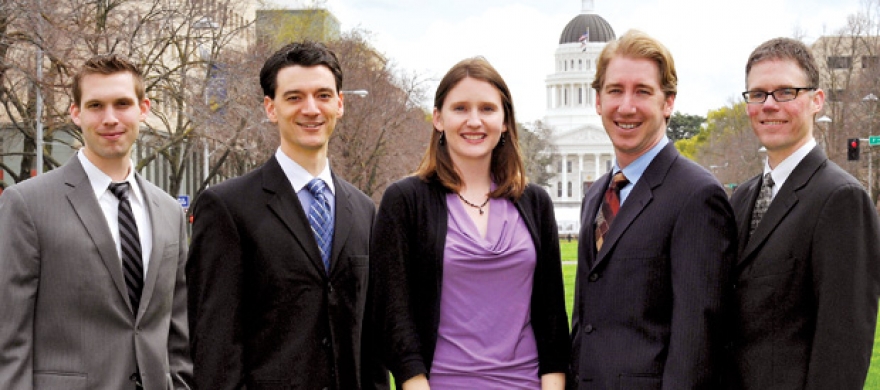The Changing Guard
School of Public Policy alumni promote democratic transparency at the California State Auditor.
“A popular government without popular information or the means of acquiring it is but a prologue to a farce or a tragedy.”
So wrote founding father James Madison in 1822. Nearly 200 years later, the fourth U.S. president’s ideal of governmental transparency remains a cornerstone of democracy. Across the nation, state auditors stand on the frontlines, fighting to keep communication channels open between the government and its citizens.
At the California State Auditor, Bureau of State Audits (BSA), a team that includes five School of Public Policy (SPP) alumni works tirelessly to deliver public evaluations of government agencies. Sean Gill (MPP ’07), Rick Power (MPP ’04, MBA ’03), Sara Mason (MPP ’09), Aaron Fellner (MPP ’07), and Robert Harris (MPP ’09) are ensconced in the trenches of government auditing, examining how a department is supposed to work versus how it actually works in highly specific circumstances.
The group, sometimes working together, at other times working on separate projects, reports on a wide range of issues from how the state disposes of radioactive waste to whether California is finding appropriate housing for sex offenders. “Being in California at this time in state government is very interesting,” says senior auditor evaluator Gill, addressing the numerous troubles currently facing the Golden State. “But we’re trying to be a part of the solution and encourage agencies to spend their money more wisely.”
When the Joint Legislative Audit Committee approves a request to conduct a performance audit for a government agency, the BSA springs its three divisions of public policy, accountancy, and business experts into action to examine the nooks and crannies of a potentially underperforming agency. “For each audit we do, we essentially have to become experts on the department or topic,” says auditor evaluator Sara Mason (née Thompson). “We need to know how people do their jobs, what laws affect their work, what their processes and controls are, and the results of their work. As soon as you know it like the back of your hand, it’s time to learn something else.”
A typical puzzle will take anywhere from three to six months of review for the nonpartisan organization, which makes recommendations from what Gill calls their “unique perspective not encumbered by any one viewpoint. We always try to be as objective as possible, which means our recommendations are usually well received and acted upon.”
One reason why approximately 80 percent of their recommendations are implemented within one year of being made might be the public nature of their findings: once released, every report is publicly available on the BSA website, even the least flattering findings. Gill recalls one audit from 2008 involving the housing of sex offenders, which rankled the departments under review but led to positive changes thanks to the very public nature of the report.
The team initially discovered that a number of registered addresses for sex offenders were actually the same addresses registered to childcare facilities. “This was something alarming that we became aware of as we were doing it," says Gill. Further investigation found that, thankfully, most of these offenders were not actually living at these registered addresses. His team recommended the legislature clarify the laws relating to where registered sex offenders may reside and that the addresses of paroled offenders be monitored and controlled. The recommendations were taken on board by the Department of Corrections and Rehabilitation and a corrective action plan was put in place, signaling a welcome outcome for the SPP team.
Although, as Power notes, “we have no authority to actually make anybody do anything; our job is to just identify an issue and recommend actions,” their team does have the opportunity to affect policy indirectly, a process Mason calls “rewarding.” “Our office has a very good reputation and a lot of respect at the capitol,” she says. “When we find problems or make recommendations, they are taken very seriously because the legislature and other decision makers know our work is thorough, accurate, and unbiased.”
Mason and her colleagues were recently able to make a difference for the state when Governor Jerry Brown asked the BSA to deliver 10 key recommendations for cutting government waste and increasing efficiency. Mason conducted background research about the budget and successful recommendations from previous audits that could be implemented by the governor now. “Unless we go in and audit a department, it is very difficult to judge where their inefficiencies might be. I can appreciate how hard it is for the governor and legislature to know where to make cuts without hurting services too much,” says Mason.
Power notes that “most of the time, people run from auditors,” so Brown reaching out to the BSA signals an active willingness in his office to promote transparency between government and the tax-paying public. Interested citizens can find out precisely what changes have been recommended to his office in the March 9 letter on the BSA website. Says Gill, “It’s so rewarding when you see you’ve effected positive change for the people of California.”
